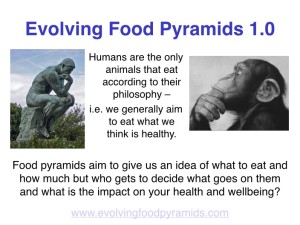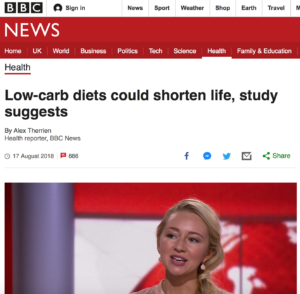How To Deal With Negative News Reports
My initial angst at the news that hit the world last week that Low Carb Diets Could Shorten Life And Increase The Risk Of An Early Death thankfully, quickly reminded me of The Serenity Prayer and how applicable it is in the face of reports like this.
God, grant me the serenity to accept the things I cannot change,
Courage to change the things I can,
And wisdom to know the difference.
Reinhold Niebuhr
And I thought it would make a good, instructive post for all of us that we can refer back to. So here we go…
God, grant me the serenity to accept the things I cannot change
In this case what we individually can’t change is that negative news happens. I think you can agree with me that’s not going away any time soon. No matter how much we may want it to, there’s nothing we can do about that. News agencies know we like being half scared to death so they do a good job at highlighting the negatives whether they are real or not. They know what will grab our attention better. Hey, they got me to write this page!
But no matter what we can’t change we can take heart and change our reactions and responses to it.
Courage to change the things we can
The biggest problem I see is that news reports like this can cause a lot of people to throw up their arms in dismay and give up on taking any steps.
Then again I have to wonder if it’s the great mass who don’t really want to think or do anything about it anyway. A sad fact of human nature is that we often don’t make changes till we have to. Generally driven by some form of personal misery
But steps do need to be taken, changes to what we put in our mouths do need to be made, to make both definitive changes to our own health first and to alter the tsunami of disease westernised nations are now experiencing. Diabetes and Alzheimers to name just two that we are very aware of.
I’ve covered the steps I recommend pretty well in my page:
But news reports like this will continue to happen and rather than have them derail us, we need to be able to garner the wisdom to…
Wisdom to know the difference
As with any news article about diet, the source of where it came from needs to be thoroughly and honestly checked before you succumb to hopelessness or waste your energy on ranting and raving. I’ll add my tuppence worth below but it’s heartening to see the immediate response on the world wide web and social media.
What I love seeing these days is that rebuttal can now be pretty instant. You just have to know who you can trust and follow. These are the ones I follow.
There is definitely a big bun fight going on in the nutritional world and it’s heating up.
Ivor Cummins wrote a Facebook post about this article entitled “The Empire strikes back, and not just with pretty faces – with artful obfuscation and devious propagandizing…! ![]() ? (all based on toilet-paper associational junk-studies
? (all based on toilet-paper associational junk-studies ![]() ?)”.
?)”.
Of course all Star Wars fans know how The Empire fared in the end and thankfully there’s enough “Revolutionaries” out there to address misinformation pretty fast these days. In their own way, stories like this and the ensuing comments only serve to support the mission of a major overhaul of the recommended nutritional guidelines.
Here’s a checklist I go through to clarify the meaningfulness of any study under consideration:
- Who authored the study? You can follow the links in news reports to the actual study. Here I find out that Walter Willet from Harvard School of Public Health was the primary author. Strike 1. Walter is profoundly fixed on the animal fat creates heart disease hypothesis and I guess has to do something to continue to validate his income. I have a lot more to say on this issue but will point you to Gary Fettke’s, a Tasmanian Orthopaedic Surgeon’s research. [youtube]https://www.youtube.com/watch?v=DWCQF-FFJYk&index=163&list=PL703A2C1ACB86FD95&t=1956s[/youtube]
- Is it an epidemiological/observational/associational (these terms all mean the same thing) study or a double blind random trial study? Strike 2. It was an epidemiolical study. Meaning the whole point of epidemiology is to draw inferences that can be studied more to see if there is a true cause and effect relationship. A fact about epidemiology that many epidemiologist conveniently forget when it suits their personal opinions and of course their wallets. While double blind RCT’s can be manipulated meaning you’ll need to look deeper to see any flaws, epidemiology is still epidemiology and only meant as a signpost that more real trials are needed or not.
- What were the testing procedures, the findings and were they accurately reported? Strike 3 – see below.
There are a few points I’d like to make about Strike 3 but for the moment I’ll settle for these two:
- The amount of carbohydrates they are comparing in the study are all just different versions of a high carbohydrate diet. The study compares <40% right through to >70% of calories from carbohydrate. True Low Carb diets are more like 5-10%. So no conclusions can or should be drawn from this about low carbohydrate diets because the study didn’t isolate low carbohydrate diets.
- The study states that the people in the lower carbohydrate group also: “Participants who consumed a relatively low percentage of total energy from carbohydrates (ie, participants in the lowest quantiles) were more likely to be young, male, a self-reported race other than black, college graduates, have high body-mass index, exercise less during leisure time, have high household income, smoke cigarettes, and have diabetes. “ Do males die younger than females in general? YES. Do people with a high body mass index die younger in general? YES. Do people who smoke die earlier in general? YES. Do people have diabetes die younger in general? YES. I think from that we can see that the higher death rates were more likely to come from those things rather than the amount of carbohydrates specifically. And remember 40% is not a low carbohydrate diet.
So with these three strikes we can safely go about the business of looking after ourselves. The Empire certainly won’t be helping us to do that anytime soon. You’ll need to forgive my cynicism. As far as I’m concerned they’re intelligent enough to know better.
It would also be really helpful if journalists and their editors took a leaf out of the work habits of my two favourite journalists in the diet arena. Gary Taubes and Nina Teicholz and did their own research before publishing something that really doesn’t deserve the time of day.
As you can hopefully see, once you know what to look for, it’s really not that hard.
With that wisdom, serenity comes a bit easier and courage more steadfast.

